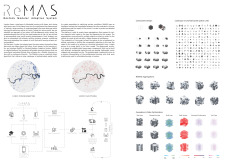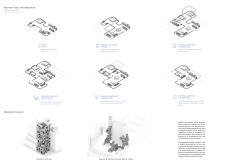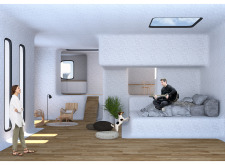5 key facts about this project
ReMAS (Restock Modular Adaptive System) is a thoughtful solution to the growing shortage of affordable housing in London. The project acknowledges the city's complex landscape, marked by underdeveloped sites and older public housing that is in decline.
With its focus on urban infill development, ReMAS aims to revitalize these areas while also improving existing housing projects. The design centers on modularity, creating adaptable living spaces that can change according to the diverse needs of residents.
Modular Design Approach
The project uses a digital platform with a constraint-solver algorithm to generate housing options that respond to specific site conditions, community preferences, and regulatory requirements. This focus on adaptability allows the housing units to serve individuals or larger families. It provides solutions that can evolve over time, reflecting the changing circumstances of the people who live there.
Housing Configurations
The design features a range of apartment types, including studio units for single individuals and one- to three-bedroom apartments that can expand or contract based on family size. The versatility of these units is significant, as they can accommodate various living situations. This approach encourages efficient use of space, ensuring that homes can adapt as community needs shift.
Visual Integration with Urban Context
Renderings of the project highlight the integration of modular structures within the London skyline. These images show how ReMAS fits within the existing urban environment, balancing modern design with historical architecture. The flexibility inherent in the design allows buildings to vary in height and spread, adapting to the particular characteristics of each site. This responsiveness to the urban context enhances the overall relationship between new development and its surroundings.
Sustainable Practices
ReMAS embodies a commitment to creating efficient and adaptable housing solutions. The intelligent modular framework encourages sustainable living, while the careful design respects the existing urban landscape. The diverse housing configurations are designed to meet the varying needs of London’s residents, promoting a responsive approach to urban living.






















































